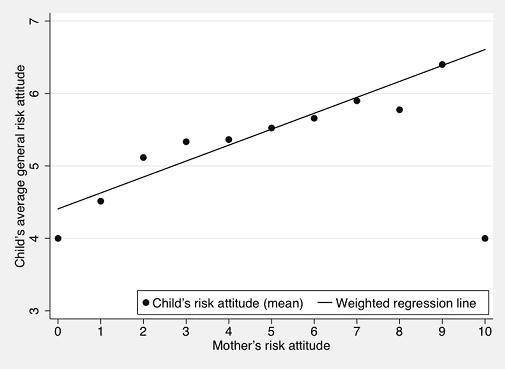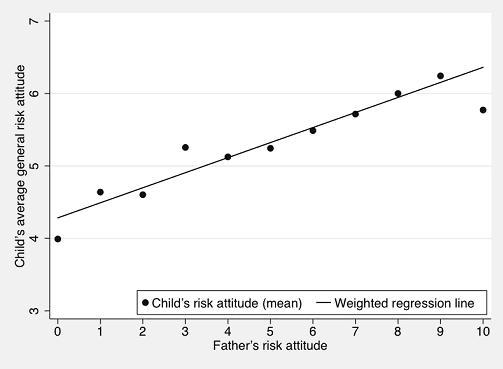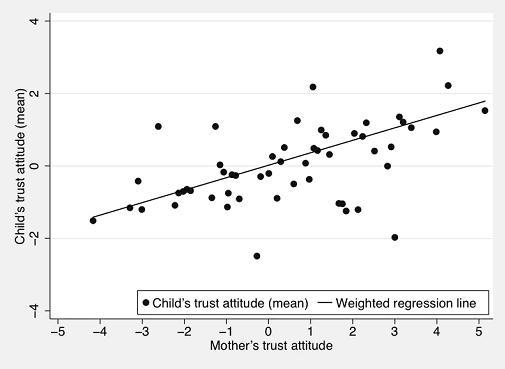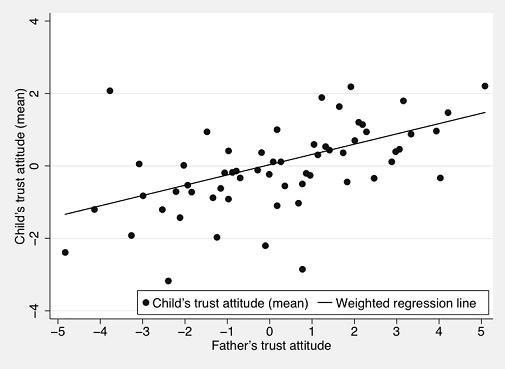Understanding persistent differences in growth across countries is a top concern of economists and policy makers. Recent research points to a role for national attitudes, such as the level of trust in a country, for explaining differences in growth (Knack and Keefer 1997). High levels of trust, measured by survey questions asking individuals how much they trust other people, are associated with faster growth. This appears to reflect a causal impact of trust on economic activity rather than the reverse (see, e.g., Algan and Cahuc, 2007).
There is less research relating other attitudes to macroeconomic outcomes, due mainly to lack of data, but risk attitudes are also likely to be very important. A recent study comparing the United States and Germany shows a large difference in risk attitudes, with Germans being less willing to take risks (Naef et al., 2007). Risk attitudes are known to predict important behaviours at the individual level, such as investment in risky assets, and risky occupational choice such as entrepreneurship (e.g., Dohmen et al., 2005). Thus, greater willingness to take risks in a population is likely to pay off in the long run, due to higher rates of investment and innovation.
Attitudes and economies
The potential for attitudinal differences to explain cross-country differences in economic outcomes is an old idea in political economy and sociology, as evidenced by the work of Max Weber at the turn of the century. One reason why economists have only recently begun to study the link between attitudes and economic phenomena is that they have traditionally been sceptical of how meaningful such subjective measures are. Without economic incentives to answer attitude questions accurately, and with only a qualitative response scale on which to indicate attitudes, such measures could give very noisy or even misleading results. A finding that economic growth is related to survey measures of trust would not convince a sceptical economist, because survey responses could proxy for a host of other variables related to economic growth rather than actually measuring trust.
Recent research, including some of our own work, uses techniques from experimental economics to try to assess the validity of attitude measures. The idea is to have subjects answer standard attitude questions, and then participate in carefully constructed choice experiments that involve real economic consequences. The experiments are intended to isolate a specific motive or attitude and rule out other motives by design. For example, a recent experiment done with a representative sample of about 450 Germans found that trust questions reliably predicted trusting behaviour in the so-called trust game (Ferh et al., 2003). One of our own studies, involving an experiment with a different representative sample of almost 500 Germans, found that a simple question asking people to rate their willingness to take risks on an eleven-point scale reliably predicted willingness to play risky lotteries involving real money (Dohmen et al., 2005). This evidence lends credence to the interpretation of previous studies, that the relationship between attitude measures and growth in fact reflects the impact of specific attitudes like trust.
Intergenerational transmission of attitudes
How do attitude differences across countries come to exist, and how do they persist over time? One explanation is that major historical events lead at some point to divergence in attitudes between nations, and then these differences in attitudes are passed from one generation to the next, through a channel of parents inculcating children with their own values and attitudes (Tabellini, 2008). Departing from the usual practice in economics of taking preferences, or attitudes, as given, a wave of recent theoretical models have made attitudes endogenous by explicitly assuming that parents have a preference for endowing children with attitudes similar to their own and exert effort in order to shape child endowments (see Fernandez, 2007a). This preference also affects parents’ marriage choices, causing them to seek out a spouse with similar attitudes, in order to avoid distortions in the child’s attitudes. Parents pass on their attitudes to their children, perpetuating differences in economic behaviour between populations with different attitudes or cultures. Some models also allow for an influence of other role models in the surrounding environment, in addition to or instead of the parents, which tends to reinforce and perpetuate regional differences in attitudes (see Bisin and Verdier, 2000).
While assuming transmission of attitudes from parents to children is plausible and allows theoretical models to explain an important set of facts, there has been little systematic evidence on intergenerational transmission at the level of attitudes. Some of our recent work tests whether children end up with similar trust, and similar risk attitudes to their parents (Dohmen et al., 2006). We also investigate whether parents marry individuals with similar attitudes, and whether child attitudes are related to the prevailing attitudes in the local geographic region. We use the experimentally validated survey measures discussed above, for a sample of more than 3,000 children and their parents. The data are drawn from the 2003 and 2004 waves of the SOEP, a representative panel survey of the adult population living in Germany.
We find that parents who are more trusting and parents who are risk tolerant have children with similar attitudes. The correlation is strong with both mothers and fathers for risk; for trust, the mother plays a more important role than the father. Parents also tend to marry individuals with similar trust and risk attitudes. This reinforces the impact on the child; having one parent with a given attitude means that the child is likely to have a second parent with that attitude as well. We also find a role for environment, because child attitudes are similar to the prevailing attitudes in the local geographic region, even controlling for parental attitudes. Whether attitude transmission works through nurture, nature, or both is not clear, although several pieces of evidence suggest that nurture must play some role. For example, only-children are more similar to parents in terms of attitudes than children with siblings, which is hard to explain with a purely genetic story. It is consistent with only-children receiving more undivided attention and socialisation from the parents. An important area for future research is investigating how different parental characteristics and family structures matter for the transmission of child attitudes.
Figure 1. Child’s attitudes towards risk and trust as functions of parental attitudes
Notes: The top two graphs in the figure show children's average self-reported willingness to take risks, from 0 (completely unwilling) to 10 (completely willing), for a given willingness to take risks of the parent. The bottom two graphs in the figure show children's average principal component “trust”, a summary measure of the level of agreement with three different statements about trustworthiness of people in general, for a given principal component ``trust'' of the parent.
Policy implications
Evidence of transmission of attitudes from parents to children is also highly relevant for understanding why there is a strong persistence in economic outcomes across generations for individual families. There is a large literature studying social mobility with countries, which documents substantial correlations between parents and children in terms of wealth, education, and occupation. Transmission of attitudes could be one mechanism underlying such correlations: one reason that children may end up with similar outcomes to their parents may be that they inherit similar attitudes and thus make similar economic choices. Trust and risk attitudes are both relevant for the types of outcomes that are typically correlated between parents and children, such as wealth accumulation and occupational choice. Other attitudes are also likely to be important, for example patience. A role for attitudes in explaining intergenerational correlation in economic outcomes points to the importance of a child’s home environment and parental attitudes as policy levers for addressing lack of social mobility. Interfering with the ways that a family raises its children is of course controversial and problematic from a policy perspective. We find that parental characteristics, such as education, are related to attitudes, however, with more educated parents being more trusting and more willing to take risks. Carniero et al. (2007) show that influencing mother’s education is a useful way to affect child outcomes like test scores, grade repetition, and obesity. Our results suggest one mechanism through which policies focused on parental education could affect child outcomes: an effect on child attitudes.
References
Algan, Yann and Pierre Cahuc (2007) “Social Attitudes and Economic Development: An Epidemiological Approach”, IZA Discussion Paper No. 2935.
Bisin, Alberto and Thierry Verdier (2000) ““Beyond the Melting Pot”: Cultural Transmission, Marriage, and the Evolution of Ethnic and Religious Traits”, Quarterly Journal of Economics, 115(3), 955–988.
Dohmen, Thomas; Falk, Armin; Huffman, David ; Sunde, Uwe; Schupp, Juergen and Gert Wagner (2005) “Individual Risk Attitudes: New Evidence From a Large, Representative, Experimentally-Validated Survey”, IZA Discussion Paper No. 1730.
Dohmen, Thomas; Falk, Armin; Huffman, David and Uwe Sunde (2006) “The Intergenerational Transmission of Risk and Trust Attitudes”, IZA Discussion Paper No. 2380.
Carneiro, P.; Meghir, C. & Parey, M. (2007) “Maternal Education, Home Environments and the Development of Children and Adolescents”, CEPR Discussion Paper DP6505. Link: www.cepr.org/pubs/dps/DP6505.asp
Fehr, Ernst; Fischbacher, Urs; von Rosenbladt, Bernhard; Schupp, Juergen and Gert Wagner (2003) “A Nation-Wide Laboratory - Examining Trust and Trustworthiness by Integrating Experiments in Representative Surveys”, IEW Working Paper No. 141.
Knack, Stephen and Philip Keefer (1997) “Does social capital have a economic payoff, A cross-country comparison”, Quarterly Journal of Economics, (112), 1251-1288.
Naef, Michael; Ernst Fehr; Urs Fischbacher; Juergen Schupp and Gert Wagner (2007)
“Decomposing Trust: Explaining National and Ethnical Trust Differences”, IEW Mimeo.
Tabellini, Guido (2008) “The Scope of Cooperation: Values and Incentives”, forthcoming Quarterly Journal of Economics.









